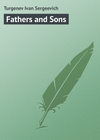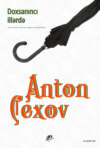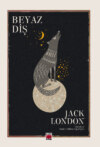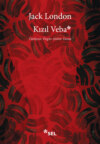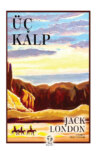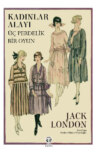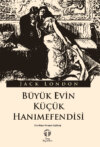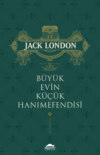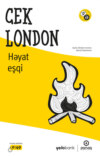Kitabı oku: «The Sea Wolf», sayfa 13
CHAPTER XXII
I knew what it was as she came toward me. For ten minutes I had watched her talking earnestly with the engineer, and now, with a sign for silence, I drew her out of earshot of the helmsman. Her face was white and set; her large eyes, larger than usual what of the purpose in them, looked penetratingly into mine. I felt rather timid and apprehensive, for she had come to search Humphrey Van Weyden’s soul, and Humphrey Van Weyden had nothing of which to be particularly proud since his advent on the Ghost.
We walked to the break of the poop, where she turned and faced me. I glanced around to see that no one was within hearing distance.
“What is it?” I asked gently; but the expression of determination on her face did not relax.
“I can readily understand,” she began, “that this morning’s affair was largely an accident; but I have been talking with Mr. Haskins. He tells me that the day we were rescued, even while I was in the cabin, two men were drowned, deliberately drowned-murdered.”
There was a query in her voice, and she faced me accusingly, as though I were guilty of the deed, or at least a party to it.
“The information is quite correct,” I answered. “The two men were murdered.”
“And you permitted it!” she cried.
“I was unable to prevent it, is a better way of phrasing it,” I replied, still gently.
“But you tried to prevent it?” There was an emphasis on the “tried,” and a pleading little note in her voice.
“Oh, but you didn’t,” she hurried on, divining my answer. “But why didn’t you?”
I shrugged my shoulders. “You must remember, Miss Brewster, that you are a new inhabitant of this little world, and that you do not yet understand the laws which operate within it. You bring with you certain fine conceptions of humanity, manhood, conduct, and such things; but here you will find them misconceptions. I have found it so,” I added, with an involuntary sigh.
She shook her head incredulously.
“What would you advise, then?” I asked. “That I should take a knife, or a gun, or an axe, and kill this man?”
She half started back.
“No, not that!”
“Then what should I do? Kill myself?”
“You speak in purely materialistic terms,” she objected. “There is such a thing as moral courage, and moral courage is never without effect.”
“Ah,” I smiled, “you advise me to kill neither him nor myself, but to let him kill me.” I held up my hand as she was about to speak. “For moral courage is a worthless asset on this little floating world. Leach, one of the men who were murdered, had moral courage to an unusual degree. So had the other man, Johnson. Not only did it not stand them in good stead, but it destroyed them. And so with me if I should exercise what little moral courage I may possess.
“You must understand, Miss Brewster, and understand clearly, that this man is a monster. He is without conscience. Nothing is sacred to him, nothing is too terrible for him to do. It was due to his whim that I was detained aboard in the first place. It is due to his whim that I am still alive. I do nothing, can do nothing, because I am a slave to this monster, as you are now a slave to him; because I desire to live, as you will desire to live; because I cannot fight and overcome him, just as you will not be able to fight and overcome him.”
She waited for me to go on.
“What remains? Mine is the role of the weak. I remain silent and suffer ignominy, as you will remain silent and suffer ignominy. And it is well. It is the best we can do if we wish to live. The battle is not always to the strong. We have not the strength with which to fight this man; we must dissimulate, and win, if win we can, by craft. If you will be advised by me, this is what you will do. I know my position is perilous, and I may say frankly that yours is even more perilous. We must stand together, without appearing to do so, in secret alliance. I shall not be able to side with you openly, and, no matter what indignities may be put upon me, you are to remain likewise silent. We must provoke no scenes with this man, nor cross his will. And we must keep smiling faces and be friendly with him no matter how repulsive it may be.”
She brushed her hand across her forehead in a puzzled way, saying, “Still I do not understand.”
“You must do as I say,” I interrupted authoritatively, for I saw Wolf Larsen’s gaze wandering toward us from where he paced up and down with Latimer amidships. “Do as I say, and ere long you will find I am right.”
“What shall I do, then?” she asked, detecting the anxious glance I had shot at the object of our conversation, and impressed, I flatter myself, with the earnestness of my manner.
“Dispense with all the moral courage you can,” I said briskly. “Don’t arouse this man’s animosity. Be quite friendly with him, talk with him, discuss literature and art with him-he is fond of such things. You will find him an interested listener and no fool. And for your own sake try to avoid witnessing, as much as you can, the brutalities of the ship. It will make it easier for you to act your part.”
“I am to lie,” she said in steady, rebellious tones, “by speech and action to lie.”
Wolf Larsen had separated from Latimer and was coming toward us. I was desperate.
“Please, please understand me,” I said hurriedly, lowering my voice. “All your experience of men and things is worthless here. You must begin over again. I know,-I can see it-you have, among other ways, been used to managing people with your eyes, letting your moral courage speak out through them, as it were. You have already managed me with your eyes, commanded me with them. But don’t try it on Wolf Larsen. You could as easily control a lion, while he would make a mock of you. He would-I have always been proud of the fact that I discovered him,” I said, turning the conversation as Wolf Larsen stepped on the poop and joined us. “The editors were afraid of him and the publishers would have none of him. But I knew, and his genius and my judgment were vindicated when he made that magnificent hit with his ‘Forge.’”
“And it was a newspaper poetry,” she said glibly.
“It did happen to see the light in a newspaper,” I replied, “but not because the magazine editors had been denied a glimpse at it.”
“We were talking of Harris,” I said to Wolf Larsen.
“Oh, yes,” he acknowledged. “I remember the ‘Forge.’ Filled with pretty sentiments and an almighty faith in human illusions. By the way, Mr. Van Weyden, you’d better look in on Cooky. He’s complaining and restless.”
Thus was I bluntly dismissed from the poop, only to find Mugridge sleeping soundly from the morphine I had given him. I made no haste to return on deck, and when I did I was gratified to see Miss Brewster in animated conversation with Wolf Larsen. As I say, the sight gratified me. She was following my advice. And yet I was conscious of a slight shock or hurt in that she was able to do the thing I had begged her to do and which she had notably disliked.
CHAPTER XXIII
Brave winds, blowing fair, swiftly drove the Ghost northward into the seal herd. We encountered it well up to the forty-fourth parallel, in a raw and stormy sea across which the wind harried the fog-banks in eternal flight. For days at a time we could never see the sun nor take an observation; then the wind would sweep the face of the ocean clean, the waves would ripple and flash, and we would learn where we were. A day of clear weather might follow, or three days or four, and then the fog would settle down upon us, seemingly thicker than ever.
The hunting was perilous; yet the boats, lowered day after day, were swallowed up in the grey obscurity, and were seen no more till nightfall, and often not till long after, when they would creep in like sea-wraiths, one by one, out of the grey. Wainwright-the hunter whom Wolf Larsen had stolen with boat and men-took advantage of the veiled sea and escaped. He disappeared one morning in the encircling fog with his two men, and we never saw them again, though it was not many days when we learned that they had passed from schooner to schooner until they finally regained their own.
This was the thing I had set my mind upon doing, but the opportunity never offered. It was not in the mate’s province to go out in the boats, and though I man #339;uvred cunningly for it, Wolf Larsen never granted me the privilege. Had he done so, I should have managed somehow to carry Miss Brewster away with me. As it was, the situation was approaching a stage which I was afraid to consider. I involuntarily shunned the thought of it, and yet the thought continually arose in my mind like a haunting spectre.
I had read sea-romances in my time, wherein figured, as a matter of course, the lone woman in the midst of a shipload of men; but I learned, now, that I had never comprehended the deeper significance of such a situation-the thing the writers harped upon and exploited so thoroughly. And here it was, now, and I was face to face with it. That it should be as vital as possible, it required no more than that the woman should be Maud Brewster, who now charmed me in person as she had long charmed me through her work.
No one more out of environment could be imagined. She was a delicate, ethereal creature, swaying and willowy, light and graceful of movement. It never seemed to me that she walked, or, at least, walked after the ordinary manner of mortals. Hers was an extreme lithesomeness, and she moved with a certain indefinable airiness, approaching one as down might float or as a bird on noiseless wings.
She was like a bit of Dresden china, and I was continually impressed with what I may call her fragility. As at the time I caught her arm when helping her below, so at any time I was quite prepared, should stress or rough handling befall her, to see her crumble away. I have never seen body and spirit in such perfect accord. Describe her verse, as the critics have described it, as sublimated and spiritual, and you have described her body. It seemed to partake of her soul, to have analogous attributes, and to link it to life with the slenderest of chains. Indeed, she trod the earth lightly, and in her constitution there was little of the robust clay.
She was in striking contrast to Wolf Larsen. Each was nothing that the other was, everything that the other was not. I noted them walking the deck together one morning, and I likened them to the extreme ends of the human ladder of evolution-the one the culmination of all savagery, the other the finished product of the finest civilization. True, Wolf Larsen possessed intellect to an unusual degree, but it was directed solely to the exercise of his savage instincts and made him but the more formidable a savage. He was splendidly muscled, a heavy man, and though he strode with the certitude and directness of the physical man, there was nothing heavy about his stride. The jungle and the wilderness lurked in the uplift and downput of his feet. He was cat-footed, and lithe, and strong, always strong. I likened him to some great tiger, a beast of prowess and prey. He looked it, and the piercing glitter that arose at times in his eyes was the same piercing glitter I had observed in the eyes of caged leopards and other preying creatures of the wild.
But this day, as I noted them pacing up and down, I saw that it was she who terminated the walk. They came up to where I was standing by the entrance to the companion-way. Though she betrayed it by no outward sign, I felt, somehow, that she was greatly perturbed. She made some idle remark, looking at me, and laughed lightly enough; but I saw her eyes return to his, involuntarily, as though fascinated; then they fell, but not swiftly enough to veil the rush of terror that filled them.
It was in his eyes that I saw the cause of her perturbation. Ordinarily grey and cold and harsh, they were now warm and soft and golden, and all a-dance with tiny lights that dimmed and faded, or welled up till the full orbs were flooded with a glowing radiance. Perhaps it was to this that the golden colour was due; but golden his eyes were, enticing and masterful, at the same time luring and compelling, and speaking a demand and clamour of the blood which no woman, much less Maud Brewster, could misunderstand.
Her own terror rushed upon me, and in that moment of fear-the most terrible fear a man can experience-I knew that in inexpressible ways she was dear to me. The knowledge that I loved her rushed upon me with the terror, and with both emotions gripping at my heart and causing my blood at the same time to chill and to leap riotously, I felt myself drawn by a power without me and beyond me, and found my eyes returning against my will to gaze into the eyes of Wolf Larsen. But he had recovered himself. The golden colour and the dancing lights were gone. Cold and grey and glittering they were as he bowed brusquely and turned away.
“I am afraid,” she whispered, with a shiver. “I am so afraid.”
I, too, was afraid, and what of my discovery of how much she meant to me my mind was in a turmoil; but, I succeeded in answering quite calmly:
“All will come right, Miss Brewster. Trust me, it will come right.”
She answered with a grateful little smile that sent my heart pounding, and started to descend the companion-stairs.
For a long while I remained standing where she had left me. There was imperative need to adjust myself, to consider the significance of the changed aspect of things. It had come, at last, love had come, when I least expected it and under the most forbidding conditions. Of course, my philosophy had always recognized the inevitableness of the love-call sooner or later; but long years of bookish silence had made me inattentive and unprepared.
And now it had come! Maud Brewster! My memory flashed back to that first thin little volume on my desk, and I saw before me, as though in the concrete, the row of thin little volumes on my library shelf. How I had welcomed each of them! Each year one had come from the press, and to me each was the advent of the year. They had voiced a kindred intellect and spirit, and as such I had received them into a camaraderie of the mind; but now their place was in my heart.
My heart? A revulsion of feeling came over me. I seemed to stand outside myself and to look at myself incredulously. Maud Brewster! Humphrey Van Weyden, “the cold-blooded fish,” the “emotionless monster,” the “analytical demon,” of Charley Furuseth’s christening, in love! And then, without rhyme or reason, all sceptical, my mind flew back to a small biographical note in the red-bound Who’s Who, and I said to myself, “She was born in Cambridge, and she is twenty-seven years old.” And then I said, “Twenty-seven years old and still free and fancy free?” But how did I know she was fancy free? And the pang of new-born jealousy put all incredulity to flight. There was no doubt about it. I was jealous; therefore I loved. And the woman I loved was Maud Brewster.
I, Humphrey Van Weyden, was in love! And again the doubt assailed me. Not that I was afraid of it, however, or reluctant to meet it. On the contrary, idealist that I was to the most pronounced degree, my philosophy had always recognized and guerdoned love as the greatest thing in the world, the aim and the summit of being, the most exquisite pitch of joy and happiness to which life could thrill, the thing of all things to be hailed and welcomed and taken into the heart. But now that it had come I could not believe. I could not be so fortunate. It was too good, too good to be true. Symons’s lines came into my head:
“I wandered all these years among
A world of women, seeking you.”
And then I had ceased seeking. It was not for me, this greatest thing in the world, I had decided. Furuseth was right; I was abnormal, an “emotionless monster,” a strange bookish creature, capable of pleasuring in sensations only of the mind. And though I had been surrounded by women all my days, my appreciation of them had been #230;sthetic and nothing more. I had actually, at times, considered myself outside the pale, a monkish fellow denied the eternal or the passing passions I saw and understood so well in others. And now it had come! Undreamed of and unheralded, it had come. In what could have been no less than an ecstasy, I left my post at the head of the companion-way and started along the deck, murmuring to myself those beautiful lines of Mrs. Browning:
“I lived with visions for my company
Instead of men and women years ago,
And found them gentle mates, nor thought to know
A sweeter music than they played to me.”
But the sweeter music was playing in my ears, and I was blind and oblivious to all about me. The sharp voice of Wolf Larsen aroused me.
“What the hell are you up to?” he was demanding.
I had strayed forward where the sailors were painting, and I came to myself to find my advancing foot on the verge of overturning a paint-pot.
“Sleep-walking, sunstroke,-what?” he barked.
“No; indigestion,” I retorted, and continued my walk as if nothing untoward had occurred.
CHAPTER XXIV
Among the most vivid memories of my life are those of the events on the Ghost which occurred during the forty hours succeeding the discovery of my love for Maud Brewster. I, who had lived my life in quiet places, only to enter at the age of thirty-five upon a course of the most irrational adventure I could have imagined, never had more incident and excitement crammed into any forty hours of my experience. Nor can I quite close my ears to a small voice of pride which tells me I did not do so badly, all things considered.
To begin with, at the midday dinner, Wolf Larsen informed the hunters that they were to eat thenceforth in the steerage. It was an unprecedented thing on sealing-schooners, where it is the custom for the hunters to rank, unofficially as officers. He gave no reason, but his motive was obvious enough. Horner and Smoke had been displaying a gallantry toward Maud Brewster, ludicrous in itself and inoffensive to her, but to him evidently distasteful.
The announcement was received with black silence, though the other four hunters glanced significantly at the two who had been the cause of their banishment. Jock Horner, quiet as was his way, gave no sign; but the blood surged darkly across Smoke’s forehead, and he half opened his mouth to speak. Wolf Larsen was watching him, waiting for him, the steely glitter in his eyes; but Smoke closed his mouth again without having said anything.
“Anything to say?” the other demanded aggressively.
It was a challenge, but Smoke refused to accept it.
“About what?” he asked, so innocently that Wolf Larsen was disconcerted, while the others smiled.
“Oh, nothing,” Wolf Larsen said lamely. “I just thought you might want to register a kick.”
“About what?” asked the imperturbable Smoke.
Smoke’s mates were now smiling broadly. His captain could have killed him, and I doubt not that blood would have flowed had not Maud Brewster been present. For that matter, it was her presence which enabled. Smoke to act as he did. He was too discreet and cautious a man to incur Wolf Larsen’s anger at a time when that anger could be expressed in terms stronger than words. I was in fear that a struggle might take place, but a cry from the helmsman made it easy for the situation to save itself.
“Smoke ho!” the cry came down the open companion-way.
“How’s it bear?” Wolf Larsen called up.
“Dead astern, sir.”
“Maybe it’s a Russian,” suggested Latimer.
His words brought anxiety into the faces of the other hunters. A Russian could mean but one thing-a cruiser. The hunters, never more than roughly aware of the position of the ship, nevertheless knew that we were close to the boundaries of the forbidden sea, while Wolf Larsen’s record as a poacher was notorious. All eyes centred upon him.
“We’re dead safe,” he assured them with a laugh. “No salt mines this time, Smoke. But I’ll tell you what-I’ll lay odds of five to one it’s the Macedonia.”
No one accepted his offer, and he went on: “In which event, I’ll lay ten to one there’s trouble breezing up.”
“No, thank you,” Latimer spoke up. “I don’t object to losing my money, but I like to get a run for it anyway. There never was a time when there wasn’t trouble when you and that brother of yours got together, and I’ll lay twenty to one on that.”
A general smile followed, in which Wolf Larsen joined, and the dinner went on smoothly, thanks to me, for he treated me abominably the rest of the meal, sneering at me and patronizing me till I was all a-tremble with suppressed rage. Yet I knew I must control myself for Maud Brewster’s sake, and I received my reward when her eyes caught mine for a fleeting second, and they said, as distinctly as if she spoke, “Be brave, be brave.”
We left the table to go on deck, for a steamer was a welcome break in the monotony of the sea on which we floated, while the conviction that it was Death Larsen and the Macedonia added to the excitement. The stiff breeze and heavy sea which had sprung up the previous afternoon had been moderating all morning, so that it was now possible to lower the boats for an afternoon’s hunt. The hunting promised to be profitable. We had sailed since daylight across a sea barren of seals, and were now running into the herd.
The smoke was still miles astern, but overhauling us rapidly, when we lowered our boats. They spread out and struck a northerly course across the ocean. Now and again we saw a sail lower, heard the reports of the shot-guns, and saw the sail go up again. The seals were thick, the wind was dying away; everything favoured a big catch. As we ran off to get our leeward position of the last lee boat, we found the ocean fairly carpeted with sleeping seals. They were all about us, thicker than I had ever seen them before, in twos and threes and bunches, stretched full length on the surface and sleeping for all the world like so many lazy young dogs.
Under the approaching smoke the hull and upper-works of a steamer were growing larger. It was the Macedonia. I read her name through the glasses as she passed by scarcely a mile to starboard. Wolf Larsen looked savagely at the vessel, while Maud Brewster was curious.
“Where is the trouble you were so sure was breezing up, Captain Larsen?” she asked gaily.
He glanced at her, a moment’s amusement softening his features.
“What did you expect? That they’d come aboard and cut our throats?”
“Something like that,” she confessed. “You understand, seal-hunters are so new and strange to me that I am quite ready to expect anything.”
He nodded his head. “Quite right, quite right. Your error is that you failed to expect the worst.”
“Why, what can be worse than cutting our throats?” she asked, with pretty na #239;ve surprise.
“Cutting our purses,” he answered. “Man is so made these days that his capacity for living is determined by the money he possesses.”
“’Who steals my purse steals trash,’” she quoted.
“Who steals my purse steals my right to live,” was the reply, “old saws to the contrary. For he steals my bread and meat and bed, and in so doing imperils my life. There are not enough soup-kitchens and bread-lines to go around, you know, and when men have nothing in their purses they usually die, and die miserably-unless they are able to fill their purses pretty speedily.”
“But I fail to see that this steamer has any designs on your purse.”
“Wait and you will see,” he answered grimly.
We did not have long to wait. Having passed several miles beyond our line of boats, the Macedonia proceeded to lower her own. We knew she carried fourteen boats to our five (we were one short through the desertion of Wainwright), and she began dropping them far to leeward of our last boat, continued dropping them athwart our course, and finished dropping them far to windward of our first weather boat. The hunting, for us, was spoiled. There were no seals behind us, and ahead of us the line of fourteen boats, like a huge broom, swept the herd before it.
Our boats hunted across the two or three miles of water between them and the point where the Macedonia’s had been dropped, and then headed for home. The wind had fallen to a whisper, the ocean was growing calmer and calmer, and this, coupled with the presence of the great herd, made a perfect hunting day-one of the two or three days to be encountered in the whole of a lucky season. An angry lot of men, boat-pullers and steerers as well as hunters, swarmed over our side. Each man felt that he had been robbed; and the boats were hoisted in amid curses, which, if curses had power, would have settled Death Larsen for all eternity-“Dead and damned for a dozen iv eternities,” commented Louis, his eyes twinkling up at me as he rested from hauling taut the lashings of his boat.
“Listen to them, and find if it is hard to discover the most vital thing in their souls,” said Wolf Larsen. “Faith? and love? and high ideals? The good? the beautiful? the true?”
“Their innate sense of right has been violated,” Maud Brewster said, joining the conversation.
She was standing a dozen feet away, one hand resting on the main-shrouds and her body swaying gently to the slight roll of the ship. She had not raised her voice, and yet I was struck by its clear and bell-like tone. Ah, it was sweet in my ears! I scarcely dared look at her just then, for the fear of betraying myself. A boy’s cap was perched on her head, and her hair, light brown and arranged in a loose and fluffy order that caught the sun, seemed an aureole about the delicate oval of her face. She was positively bewitching, and, withal, sweetly spirituelle, if not saintly. All my old-time marvel at life returned to me at sight of this splendid incarnation of it, and Wolf Larsen’s cold explanation of life and its meaning was truly ridiculous and laughable.
“A sentimentalist,” he sneered, “like Mr. Van Weyden. Those men are cursing because their desires have been outraged. That is all. What desires? The desires for the good grub and soft beds ashore which a handsome pay-day brings them-the women and the drink, the gorging and the beastliness which so truly expresses them, the best that is in them, their highest aspirations, their ideals, if you please. The exhibition they make of their feelings is not a touching sight, yet it shows how deeply they have been touched, how deeply their purses have been touched, for to lay hands on their purses is to lay hands on their souls.”
“’You hardly behave as if your purse had been touched,” she said, smilingly.
“Then it so happens that I am behaving differently, for my purse and my soul have both been touched. At the current price of skins in the London market, and based on a fair estimate of what the afternoon’s catch would have been had not the Macedonia hogged it, the Ghost has lost about fifteen hundred dollars’ worth of skins.”
“You speak so calmly-” she began.
“But I do not feel calm; I could kill the man who robbed me,” he interrupted. “Yes, yes, I know, and that man my brother-more sentiment! Bah!”
His face underwent a sudden change. His voice was less harsh and wholly sincere as he said:
“You must be happy, you sentimentalists, really and truly happy at dreaming and finding things good, and, because you find some of them good, feeling good yourself. Now, tell me, you two, do you find me good?”
“You are good to look upon-in a way,” I qualified.
“There are in you all powers for good,” was Maud Brewster’s answer.
“There you are!” he cried at her, half angrily. “Your words are empty to me. There is nothing clear and sharp and definite about the thought you have expressed. You cannot pick it up in your two hands and look at it. In point of fact, it is not a thought. It is a feeling, a sentiment, a something based upon illusion and not a product of the intellect at all.”
As he went on his voice again grew soft, and a confiding note came into it. “Do you know, I sometimes catch myself wishing that I, too, were blind to the facts of life and only knew its fancies and illusions. They’re wrong, all wrong, of course, and contrary to reason; but in the face of them my reason tells me, wrong and most wrong, that to dream and live illusions gives greater delight. And after all, delight is the wage for living. Without delight, living is a worthless act. To labour at living and be unpaid is worse than to be dead. He who delights the most lives the most, and your dreams and unrealities are less disturbing to you and more gratifying than are my facts to me.”
He shook his head slowly, pondering.
“I often doubt, I often doubt, the worthwhileness of reason. Dreams must be more substantial and satisfying. Emotional delight is more filling and lasting than intellectual delight; and, besides, you pay for your moments of intellectual delight by having the blues. Emotional delight is followed by no more than jaded senses which speedily recuperate. I envy you, I envy you.”
He stopped abruptly, and then on his lips formed one of his strange quizzical smiles, as he added:
“It’s from my brain I envy you, take notice, and not from my heart. My reason dictates it. The envy is an intellectual product. I am like a sober man looking upon drunken men, and, greatly weary, wishing he, too, were drunk.”
“Or like a wise man looking upon fools and wishing he, too, were a fool,” I laughed.
“Quite so,” he said. “You are a blessed, bankrupt pair of fools. You have no facts in your pocketbook.”
“Yet we spend as freely as you,” was Maud Brewster’s contribution.
“More freely, because it costs you nothing.”
“And because we draw upon eternity,” she retorted.
“Whether you do or think you do, it’s the same thing. You spend what you haven’t got, and in return you get greater value from spending what you haven’t got than I get from spending what I have got, and what I have sweated to get.”


